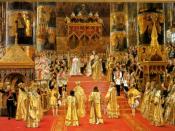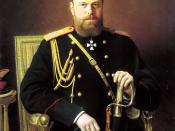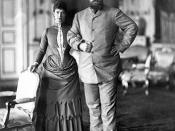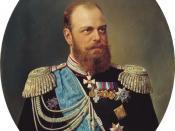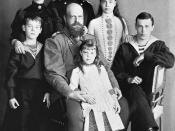There is no doubt that Alexander III was one of the most fascinating figures of modern European history. He ruled as Tsar of Russia for less than 15 years, yet he changed the country more than many of his predecessors. Traditionally it is assumed that he was a reactionary, unlike the reformer his father, Alexander II, had been. However, as so often the case, this interpretation of Alexander IIIÃÂs rule is not so undisputed. There is much reason to believe that despite some different policies, ultimately both men wanted to reach the same goals. Alexander III unquestionably did undermine the reforming policies of his father, but the underlying reasons for this are not so obvious.
ÃÂThe reign of Alexander II which began with bright promise, and changed to dreary stagnation, ended in tragedy. The Tsar-liberator was a victim of the unsolved conflict between social reform and the dogma of political autocracyÃÂ.
This is a quote taken from Seton Watson, a famous historian, which perfectly sums up Alex IIÃÂs (as he preferred to be called) reign. Alex came to power in 1855, as a 37 year old man. He had received a very good, liberal education so he was well prepared for his upcoming task to govern.
From the start of Alexander IIÃÂs reign was set to be different than that of his predecessors. With the Crimean war Russia had suffered a heavy, embarrassing, defeat on her own doorstep. Alexander knew something had to change in order for his country to be successful once again!ÃÂAlexander the LiberatorÃÂ is a popular nickname many historians have given Alexander II. This is due to one vital reformation he initiated; he freed the serfs. In 1861 over 40 million serfs were emancipated. The motifs for this reform were questionable, possibly Alexander wanted nothing more than to avoid a revolution from the lower classes. The ÃÂfreeÃÂ serfs now had the right to own land and marry, yet for the land they ÃÂownedÃÂ, they had to pay redemption for 49 years. The Mir (local commune) was responsible for payments and could repartition land anytime it wanted to. The landowner kept one third of the land, usually the most fertile piece, so in practice the serfs did not greatly benefit from this change.
Previous Tsars had kept Russia as an isolated country. Little was traded or exported; the emperors had little interest in European affairs. Different also in this aspect, Alexander II planned and built almost 14000 miles of railway by 1881, to not only increase military power, but also successfully export grain. Banks were established and settlement limitations on Jews were lifted.
He had never been a military man, possibly because he had lived through and seen RussiaÃÂs defeat in the Crimean war. Despite, or maybe because of, this he reformed a great deal in this field; most importantly the military conscription was lowered from 25 to only 6 years. Military service was no longer a punishment for crime, and social class (officially) no longer made a difference to military drafts.
Alexander II also drastically reformed the local government and legal system. He created the ÃÂZemstvosÃÂ, to which members were elected; nevertheless it was still dominated by landlords. Power of the nobles further decreased, as they lost their roles as judges and a new system with public proceedings was initiated. Also, it was made sure that the same laws applied to all classes and that the jury system and judges were independent of the government.
Alexander also liberalized education and curriculums, he founded gymnasiums (where history was not allowed to be taught) and the Zemstvos had the right to open primary schools.
All-in-all Alex IIÃÂs reign seems to have been full of new hope for the liberal citizens. However, not all was as clear and simple as it seemed. With the death of his eldest son and the falling apart of his marriage in 1865, AlexÃÂ strong will and enthusiasm for reformation slowly died. After 1865 several attempts on his life were made, making him more reactionary to his earlier years. Nonetheless on the 13th of March 1881, he agreed to create a Russian parliament. Later that day, he was murdered.
Due to the unexpected death of the hear-apparent, Nicholas, in 1865 it was something of a surprise that Alexander III became king. He had received little or no formal training to help him with his tasks, hence was not adequately educated to rule a country. It is possibly due to this, that many of Alexander IIIÃÂs decisions seemed irrational or very reactionary.
The first thing Alexander III did when he came into office was immediately recall the decision of creating a parliament. It quickly became clear that his approach to Russian politics was different to that of his fatherÃÂs, at least to that of his earlier years.
There is no question about the completely different attitude Alexander III had to Alexander II. The temperament or the credentials needed to rule a nation at this time in history was far from everything Alexander III had. He preferred the principles of personal rule, holding on to the absolute monarchy and fearing change, he also distrusted bureaucracy. Had he followed in the footsteps of his father, the Revolution might have been avoided.
Alexander III was much more conservative than his father had been. He had a strong Orthodox faith and dismissed all other religions, just like he dismissed all other nationalities. Going against what Alexander II had worked hard for, for many years he attempted to reinstate all the lost power of the nobles, he wanted to attack and abolish the Zemstvos. He reinstated the power of the nobility, by assigning specific areas ÃÂland captainsÃÂ in 1889, which essentially absolutely governed over certain provinces. The rights of the Zemstvos were reduced in 1890, when the local government was once again taken over by the nobility.
By 1865 many Russians were receiving an education, either at a gymnasium or university. Alexander III also reversed this. Perhaps he was scared that when more people were properly educated, more people would begin to question his place and position as head of state. He closed many universities; the ones he kept open were very empty as the entry was made very difficult, so as only the elite would be able to go. Universities also lost their right to self-govern, and censorship was once again extended.
Following a surprisingly anti-Semitic policy, Alexander III denied voting rights and entry to all education to Jews. Their movement was restricted and the authorities encouraged attacks on the Jewish population.
In many aspects Alexander III did reverse the reforms of his father. However, the fact that the economy continued to grow under his reign can not be dismissed. The reasons for economic growth may have been resulting from a long-term profit made by the banks and stocks opened up by Alexander II.
Alexander II's reforms were progressive but ultimately not quite effective; Alexander III reformed many of them. He was not necessarily an evil person, perhaps he simply lacked confidence. He had not received the education which was in fact, essential to be a successful ruler. Because of this many deemed him incompetent as a Tsar, so he had to assure himself and his family, for he loved his family greatly, that he was still the man with all the power.
In the end, Alexander III undermined everything his father had brought the nation. Alexander II was perhaps not the most liberal man there was, but he did bring about a certain hope which had been absent until then. Alexander II, at least up until 1865, initiated many successful reforms which helped Russia grow economically and politically. After his brutal death, his son, maybe out of fear for a similar future, urged the country to return to its previous state, the state it was in before Alexander II had ruled.
It is doubtful that reaction was indeed the best way forward for Russia at this time, but it is a possibility. In hindsight one can not know what could have happened, had things evolved differently; perhaps had Alexander III not undermined the reforming policies of his father, Russia could have had a brighter future.
Bibliography:Years of Ambition: European History, 1815-1914 - John Laver, David Cooper and David WilliamsonYears of Change: European History, 1890-1990 - Robert Wolfson and John Laver
